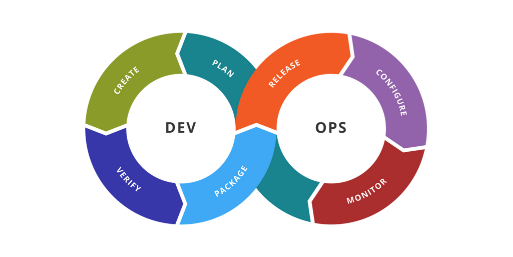What is DevOps?

If you're a software developer, you probably know how difficult it can sometimes be to coordinate your team's efforts in a way that produces the best results. In addition, it is quite difficult to collaborate with the IT team as well. However, there is a solution to this problem.
DevOps has been around for over a decade now and has saved many IT and software development teams from failure. If you want to streamline your operations, speed up your releases and start working more agile, you should start implementing DevOps in your company as soon as possible.

Combine Development with Operations
DevOps is a combination of development and IT operations. This is where “Dev” and “Ops” come from. Basically, it is a set of methods that make it possible to automate the processes between the IT team and the developers.
DevOps enables the team to build and test software much faster and make the programs more reliable. The idea or goal behind DevOps is to create an environment for the team, which previously worked separately, that they can now collaborate much more effectively.
The results of using DevOps in your company are said to be quite impressive. For example, you can improve trust, release software faster, handle unplanned work and resolve critical issues quickly. All these points are really valuable for any type of business.
DevOps is not just a group of practices but a culture, a movement, perhaps even a philosophy or a working style. It requires you to change your attitude and let go of traditional IT thinking to understand and use these technologies for collaboration and integration.
To understand what DevOps is, it is necessary to briefly look at its history. The movement started around 2008. Back then, a bunch of IT specialists and developers had realized that there was a problem affecting both their fields that needed to be addressed.
The traditional model of software development needed to be changed or replaced entirely. Previously, those who wrote the code would act separately from those who distributed and maintained the code. Developers and IT specialists would do everything without communication between the two areas. However, this was about to change.
Pioneers like John Willis and Gene Kim were at the forefront of the conversation. It all started with online discussions that then grew into a big movement in the industry. You need to take small, measurable steps to implement DevOps into your strategy, but eventually your software development and IT operations team will be able to work more efficiently and better together.

What are the benefits of DevOps?
Why is DevOps so important and how can you benefit from it? As mentioned above, there are several advantages to these methods. Let's look at some of them:
- Collaboration between departments
The biggest benefit of DevOps is the culture it allows to build, an environment where the team thrives when working together. Trust and shared responsibility are remarkable and enable better communication and understanding of each other's differences and roles.
Specialists can get faster and better feedback that enables them to update and upgrade the product more efficiently. A big part of DevOps is the "systems thinking" mentality, which means being aware of how your actions affect both your team and all the other teams involved in the project. - Faster product launches
Teams that have used DevOps methods work much more efficiently and show more high-quality and stable performance. These specialists understand that they have the same priorities, which means they can plan their work more efficiently. It's about abandoning "not my problem" thinking and adopting more progressive ideas. DevOps also takes into account automation that can simplify many tasks and improve team productivity and, in turn, trust. - Streamlined workflow
Earlier release dates are the result of an accelerated workflow. All processes become transparent and clear because there is enough communication through the DevOps methods. In addition, your DevOps team will be able to minimize downtime to get back up and running in the fastest possible way. All of this is directly related to customer satisfaction, which is also fundamental to your company's image and good reputation. - Ready for unplanned work
Managing unplanned work is important to the well-being of your business. Unexpected tasks are directly related to your team's productivity and performance, so you need to be able to manage them effectively. With more communication between the various teams, you will be more likely to anticipate and prepare for unexpected obstacles or challenges in your path.
DevOps is big, yet fairly easy to get started with. Once you get it in place and everyone is aware of their roles in DevOps, it has a huge impact on the way work is done and has a huge impact on efficiency.
These are just my opinions, experiences and how I see it. We all have shared opinions and mindsets.
The most important thing is that you create a strategy and goals together and take small steps in the right direction.
Good luck !!
